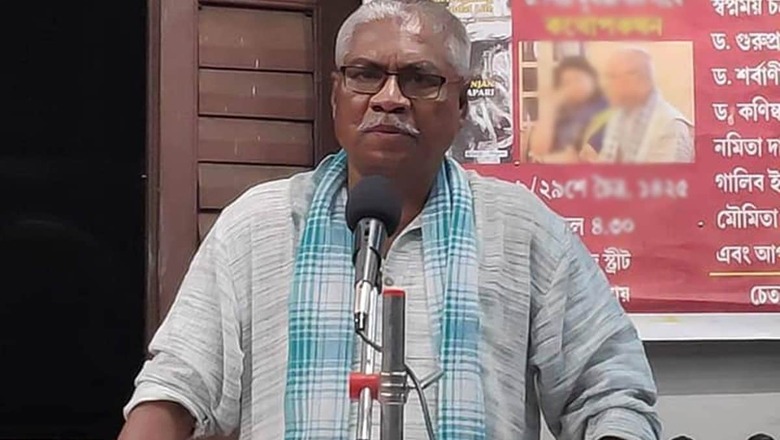
views
The year was 1981 when a lady, blessed with a calm and serene voice, asked a rickshaw puller, “Bhai Jabe? (Brother can you ferry me?).” It was a hot and humid day and the rickshaw puller, while wiping sweat from his forehead, responded quickly and said, “Didi Jabo. (Yes sister, I will go).”
The lady sat on the rickshaw in South Kolkata and asked the puller to drop her at Jadavpur University.
Though it was a brief journey, it came as a big surprise for the lady as well as the rickshaw puller when he asked the meaning of a Bangla word ‘Jijibisha’. The lady was stunned and questioned from where he learnt that word ‘Jijibisha’. Taken aback by his knowledge of Bangla literature, the lady asked his name.
The rickshaw puller, while struggling to hold his breath amid the pedalling, responded politely, “Didi amar naam Manoranjan Byapari (Sister my name of Manoranjan Byapari).”
Impressed with his command over the language, the lady answered, “The meaning of ‘Jijibisha’ is a ‘desire for living’.” Byapari was very happy to learn its meaning and as he was dropping her at the Jadavpur University, the lady introduced herself as Mahasweta Devi (late Indian writer and activist).
Thanking him for the ride, she asked Byapari to write about his life and struggle and she promised to get it published.
That was the moment which Byapari still remembers as one of the best days of his life when he luckily got a chance to meet an acclaimed writer and his life changed thereafter.
Presently, Byapari has been appointed as the chairman of the first ‘Tribal Sahitya Academy’ in Bengal by Chief Minister Mamata Banerjee.
Speaking to News18, Byapari, while sharing about his life and struggle, said, “Yes, it was a wonderful day when I luckily ferried Mahasweta Devi. I was restless to know the meaning of ‘Jijibisha’ and simply asked her without knowing about her academic background. She responded quickly and was very impressed with me. Among many memories of my struggle, that was one of the best days of my life.”
Manoranjan Byapari was born in 1950 in East Pakistan in a ‘Namasudra’ family, which migrated to West Bengal when he was three years old.
Those days were difficult to survive for the refugees as they took shelter in a camp at Kotulpur in Bankura. Later, they shifted to another refugee camp at Ghutiyari Sharif in South 24 Paraganas.
Byapari had left his home when he was a teenager to work as a daily wage labourer across various cities in India.
Later, he was associated with Naxalbari movement, on which he wrote the book ‘There’s Gunpowder in the Air’, and was jailed and kept at Alipore Correctional Centre in Kolkata. During his jail term, he indulged himself in reading books but after his release, he had to struggle a lot to make ends meet and he became a rickshaw puller in Kolkata.
He actively worked for the cause of Dalit welfare and their literature and is the probably among very few convict-turned-rickshaw pullers, without any formal education, who wrote several novels and short stories.
He always raised his voice against the oppression of the weaker sections of the society.
While sharing more about ‘Tribal Sahitya Academy’, he said, “The whole idea behind this is to promote learning sessions on tribal literature, setting up of a library and to address issues related to the tribal people. I am happy that for the first time such initiative is being taken in Bengal.”
He said, “We will try to bring all, who worked extensively on Dalit literature and their welfare, under one umbrella. I am planning to have one such institution in all the districts of Bengal with a model learning centre in Kolkata.”
Byapari said he is planning to establish a library with two rooms and set up a publication of Dalit Sahitya Academy and a Dalit Marketing Centre Operation at ‘Boi Para’ at College Street.
Also, he has suggested to organise monthly literary programme where Dalit poets and writers will meet and share their thoughts and researches, and also participate in debates. “Besides, I have also suggested to start ‘literature award’ to encourage Dalit writers and poets on behalf of the academy,” he said.
On September 14, the chief minister of West Bengal announced to set up a ‘Dalit Sahitya Academy’ and appointed Byapari as its chairman.
“Dalit literature is an important chapter and its inclusion in the Bengali literature will enrich the later. Therefore, in today’s cabinet meeting, we have decided to set up a ‘Tribal Sahitya Akademi’ in Bengal. We already have a Tribal Board but ‘Tribal Sahitya Academy’ is something new,” she had said.


















Comments
0 comment